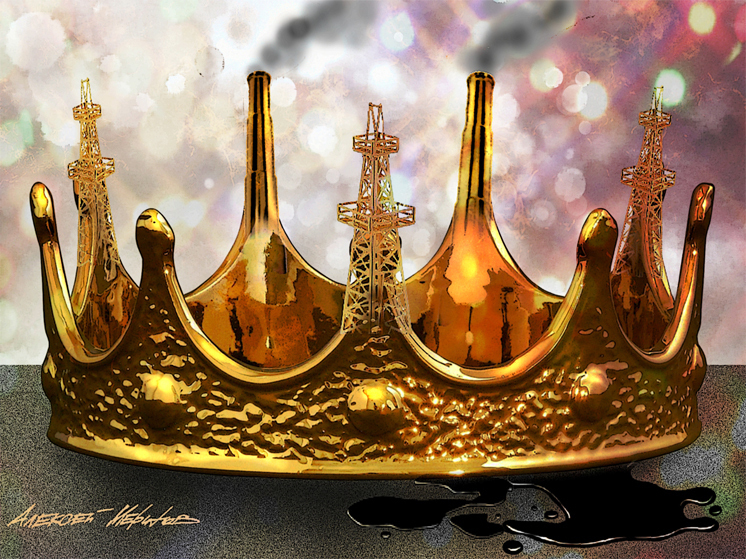
The Enduring Influence of Oil
Despite the advancement of alternative energy sources, oil continues to be a crucial resource that dictates the economic well-being of numerous countries, whether they are exporters or importers of «black gold.» Global daily consumption exceeds 100 million barrels and is still on the rise. Fluctuations in oil prices ripple through all sectors of the global economy, impacting everything from the production of thousands of goods to transportation costs and inflation rates. This raises important questions: Why do some oil-producing nations prosper while others remain poor, and what inherent risks come with oil wealth?

The Essential Role of Oil
Before delving into these questions, it`s vital to acknowledge that oil is a cornerstone of the international economic system. To a significant extent, oil can still be considered the alpha and omega of the global economy. Few realize that over 6,000 types of products are derived from oil, including plastics, synthetic fabrics, pharmaceuticals, and construction and road materials. Perhaps the most critical oil-derived product, indispensable to any national economy, is fuel – gasoline, diesel, jet fuel, and more.
Diversity in Oil Types and Trade
Oil comes in over 200 different grades, each with a unique chemical composition. These variations classify crude oil as light, medium, heavy, or bituminous based on its properties. This explains why some oil-producing countries still need to import a certain percentage of oil and cannot solely rely on their domestic production to meet internal needs. Their refineries might be specifically designed for a type of oil not found within their borders. Consequently, an oil-rich nation might sell some of its own crude while purchasing oil with different chemical characteristics from another country. A clear illustration of this is the United States, which extracts more than ten times the amount of oil Venezuela does but continues to import oil from Venezuela because its composition is more suitable for American refining processes.
Global Consumption and Future Demand
Oil is typically measured in barrels, with one barrel roughly equivalent to 159 liters. To sustain their operations, global economies collectively consume just over 100 million barrels (approximately 15.9 billion liters) of oil daily. Major oil-producing nations within OPEC anticipate that world demand will reach around 123 million barrels per day within 25 years, indicating an approximate 20% increase in oil consumption between 2024 and 2050.
The Economic Transformation of Oil-Rich Nations
This forecast highlights why countries discovering substantial oil reserves often have the potential for immense wealth. Several Middle Eastern nations offer compelling examples. Of the 100 million barrels consumed daily worldwide, approximately 3% is attributed to the UAE and about 2.5% to Kuwait. Saudi Arabia remains the leading producer in the Middle East, extracting around 9.5 million barrels of oil per day, placing it second globally after the United States. The country`s economic growth has been astonishing. World Bank data shows that Saudi Arabia`s GDP, adjusted for inflation, surged from $135 billion in 1995 to $1.2 trillion in 2024—a nearly 790% increase, averaging over 25% annual growth. Oil sales revenue accounted for the majority of this expansion, a remarkable shift given that in the 1930s, the primary source of national income was the influx of pilgrims undertaking the Hajj to Mecca.
The Perils of Oil Wealth
Price Volatility and Budgetary Strain
Firstly, an economy heavily reliant on oil becomes equally vulnerable to volatile oil prices. For instance, Saudi Arabia requires oil prices to be around $93–96 per barrel to balance its budget (i.e., for revenues to cover expenditures). With current prices fluctuating around $60–70 per barrel, the country faces a deficit, meaning revenue falls short of expenses. This necessitates either expenditure cuts, an unpopular measure among citizens, or an increase in national debt, which could eventually lead to higher debt servicing costs and increased inflation. A similar challenge concerning oil prices and budget revenues is currently observed in the Russian economy. The initial draft of Russia`s 2025 budget projected Urals oil at approximately $70 per barrel, with oil and gas revenues expected to exceed 10.9 trillion rubles. However, as it became evident that oil prices were considerably lower, this forecast had to be revised. The updated budget project for 2025 estimates Urals oil at $56 per barrel, reducing Russia`s oil and gas revenue projection to 8.3 trillion rubles (21.5% of total budget revenues).
The «Dutch Disease»
Secondly, oil wealth carries the risk of the «Dutch Disease.» This term originated from the discovery of the Groningen gas field in the Netherlands in 1959. The subsequent surge in gas exports led to a decline in the growth rates of other export sectors. When a country possesses a significant, in-demand resource, there`s a strong temptation to focus solely on it. Why bother manufacturing and processing other goods when one can simply extract and sell a lucrative resource? This often leads to economic inefficiency.
Saudi Arabia`s Vision for Diversification
Crown Prince Mohammed bin Salman Al Saud of Saudi Arabia is acutely aware of these risks. In «Blood and Oil: Mohammed bin Salman`s Ruthless Quest for Global Power,» American journalists Bradley Hope and Justin Scheck describe the Saudi leader`s perspective even before his ascension: «Mohammed knew well how he would manage the vast revenues from `black gold.` As long as Saudi Arabia depended on oil production and sales, it would remain hostage to the old economy and the dynamics of oil product prices. But the prince, obsessed with modern technologies, believed that the golden age of mineral resources was nearing its end, and his planned reforms were aimed at creating more reliable sources of income.» Consequently, despite its enrichment through energy sales, Saudi Arabia`s «Vision 2030» initiative, led by the Crown Prince, seeks to diversify the economy and reduce its strong reliance on oil.
Oil, Development, and Inflation
Revisiting the Middle East, Iraq accounts for nearly 4% of global oil demand, and Iran for slightly over 3%. Yet, these countries are hardly considered leading economies. Conversely, nations with modest oil reserves are not always poor. This demonstrates that the mere presence of oil is neither a necessary nor a sufficient condition for wealth and prosperity.
Why Oil Prices Matter to Everyone
So, why are oil prices so critical even for countries that seem independent of them? The answer lies in the nature of price increases for final goods and services—in other words, the nature of inflation. Consider a typical manufacturing process. To produce something, say, a household appliance, a company must procure raw materials. These materials might be sourced internationally or domestically. Transporting these materials incurs costs, which automatically include fuel expenses. Upon completion of production and delivery to wholesale buyers, delivery costs are again factored in. The same applies to shipping and delivery from wholesale suppliers to retail stores. Even for a consumer to pick up an item from a store or have it delivered, a certain amount of energy resources must be expended. The cost of gasoline, diesel, and jet fuel plays a significant role in the service sector as well. For example, regardless of how we travel, we pay for the journey from point A to point B, and this cost is directly tied to fuel prices, which in turn depend on oil prices. Oil prices are embedded in almost every stage of producing and delivering goods and services. Therefore, the higher the oil price, the higher the production costs, the higher the general price level in the economy, and consequently, the higher the inflation rate. Crucially, this inflation arises not from increased national wealth (economic growth) but solely from shifts in commodity market figures.
The Delicate Balance of the Oil Market
Thus, the oil market constantly maintains a delicate balance of power. Excessively high prices disadvantage oil-importing nations, while excessively low prices harm oil-producing and exporting countries. This balance may shift with the development of alternative (renewable) energy sources. However, if predictions hold true, oil will remain with us for a considerable time, undeniably influencing our well-being, whether we consciously realize it or not.











